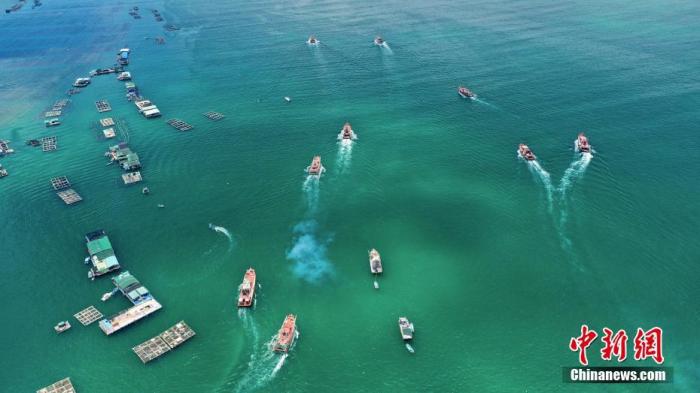(Focus on Boao) For the sustainable development of the South China Sea, what should neighboring countries do?
China News Agency, Boao, April 21 (Reporter Wang Ziqian) The South China Sea is a treasure house of resources and a common home for China and neighboring countries.
In recent years, fishery resources in the South China Sea have been over-exploited, biodiversity has been degraded, and environmental pollution has become increasingly serious.
In the post-pandemic economic recovery, how can the South China Sea take the road of sustainable development?
Data map: On August 16, 2021, the fishing moratorium in the South China Sea officially ended.
At noon that day, fishing boats located in the waters of Nan'ao, Dapeng, Shenzhen, Guangdong Province set sail one after another.
(UAV photo) Photo by China News Agency reporter Chen Wen
At the sub-forum on the theme of the South China Sea at the 2022 Boao Forum for Asia Annual Conference being held here, the guests discussed the new vision and new path for sustainable development in the South China Sea.
Tan Xingsheng, representative of the Chinese Ministry of Foreign Affairs for Boundary and Maritime Affairs, pointed out that sustainable development of the South China Sea requires sustainable peace, cooperation and institutional guarantees.
Looking to the future, managing differences is an important guarantee for the sustainable development of the South China Sea, and joint governance is the direction of our efforts.
"The South China Sea should be open and cooperative. Asian countries have common development experience and should be able to control their own destiny." Zheng Yongnian, professor at the Chinese University of Hong Kong (Shenzhen) and dean of the Qianhai Institute of International Affairs, said that on the South China Sea issue On the other hand, countries in the region should resist the military intervention of major powers outside the region, and carry out cooperation based on regional interests.
This year marks the 20th anniversary of the implementation of the Declaration on the Conduct of Parties in the South China Sea (DOC).
The declaration effectively safeguarded regional peace and stability.
At present, China and ASEAN countries are actively promoting the "Code of Conduct in the South China Sea" (COC) consultation.
Yusuf Vanandi, co-founder and researcher of the Indonesian Center for Strategic and International Studies, and Vice Chairman of the Council of China-Southeast Asia South China Sea Research Center, said that during the COC negotiation process, all stakeholders should strive to promote cooperation, while think tanks of various countries should work hard to promote cooperation. A cooperative mechanism should be established to jointly find solutions to existing problems.
Wu Shicun, the founding director of the China Institute for South China Sea Studies and chairman of the Council of the China-Southeast Asia Center for South China Sea Studies, said that countries should seize the opportunity when the situation in the South China Sea is generally stable and controllable to promote cooperation.
He suggested establishing an institutional arrangement for the cooperation mechanism of the South China Sea littoral countries through the establishment of an intergovernmental cooperation governance committee.
With economic recovery after the epidemic, green and sustainable development has become a global consensus.
Wang Sheng, president of the China Academy of South China Sea, said that from the will of the countries surrounding the South China Sea, advocating cooperation rather than confrontation has become the main theme of the development of marine undertakings.
It is expected that China and relevant ASEAN countries will meet each other halfway and make progress hand in hand.
"South China Sea cooperation should not be just about the unsustainable development of natural resources, but should provide opportunities for countries in the region to start green ocean cooperation." said Hu Yishan, a researcher at the Singapore Institute of International Affairs. sustainable livelihood.
Yusuf Vanandi said that cooperation in the South China Sea can start from low-sensitive areas first, and cooperation in environmental protection and scientific fishing in fisheries is just in time.
He called on the littoral countries of the South China Sea to jointly build biodiversity marine reserves and jointly reverse the deterioration of the ecological environment in the South China Sea.
"The resources in the South China Sea are limited, but the space for state-to-state cooperation is unlimited." Tan Yusheng said that all parties in the South China Sea should focus on the overall interests of the region and make new scientific research results better serve all countries through broader and in-depth cooperation.
The guests at the meeting believed that Hainan, with its special geographical location and free trade port policy, has the conditions to become a leader in South China Sea cooperation such as fishing and pollution control.
(Finish)

